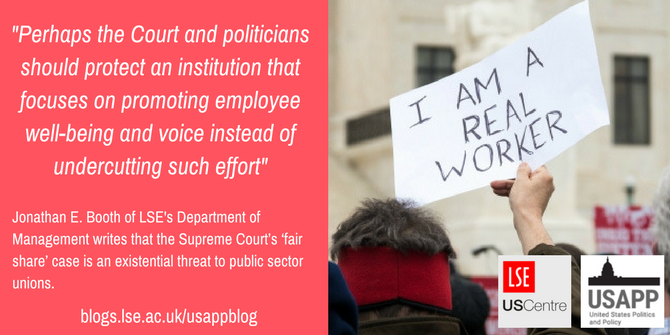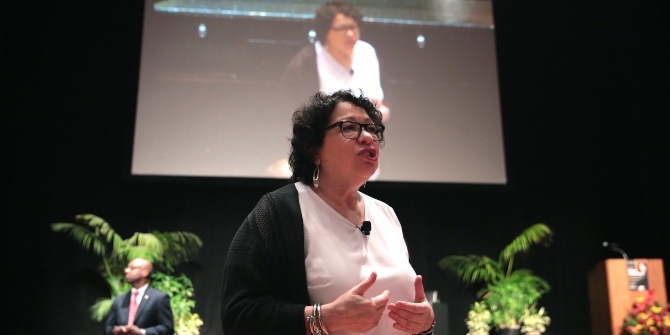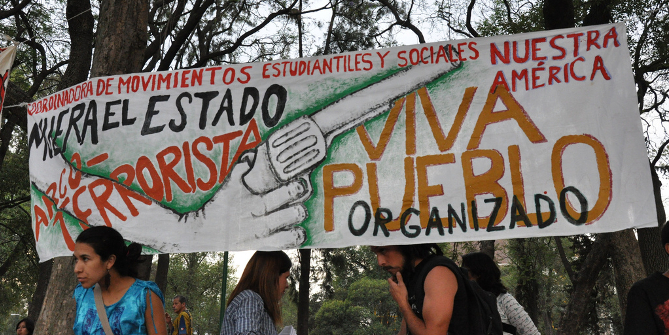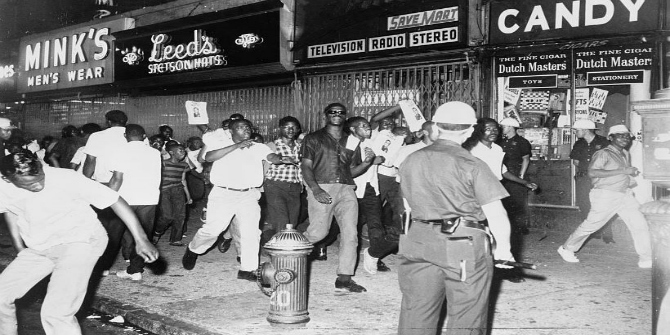 The US Supreme Court recently heard oral arguments in the Janus v. AFSCME Council 31 case, which maintains that mandatory public sector union dues violate workers’ First Amendment rights. Jonathan E. Booth argues that despite the case’s free speech claims, such ‘fair share’ fees actually enhance the voice and representation of workers. He writes that if the Court finds against these fees, public sector unions may face declining memberships and falling incomes, which they could counter by increasing engagement with their members in order to prove their value.
The US Supreme Court recently heard oral arguments in the Janus v. AFSCME Council 31 case, which maintains that mandatory public sector union dues violate workers’ First Amendment rights. Jonathan E. Booth argues that despite the case’s free speech claims, such ‘fair share’ fees actually enhance the voice and representation of workers. He writes that if the Court finds against these fees, public sector unions may face declining memberships and falling incomes, which they could counter by increasing engagement with their members in order to prove their value.
In the United States, when employees in a respective workplace have legally chosen union representation, i.e., over 50 percent of the designated group of employees have voted in favor of collective union representation either through authorization cards or an actual vote, the union has responsibility to represent all employees and negotiate their pay, working hours, and conditions of work. By law, all employees within the defined bargaining unit must be represented – even those individuals who choose not to be dues paying members. Therefore, all bargaining unit employees are covered by the collective bargaining agreement and reap the benefits from the contract and union protection. To curtail free-riding issues with those who benefit but are not members, some legal jurisdictions allow unions to require nonmembers to pay the portion of the membership dues that cover union representation, contract administration, and grievances – that is, to pay a ‘fair share’ fee. Unions are restricted in their use of fair share fees and cannot designate any of these monies for political use.
This past week, oral arguments have been heard by the US Supreme Court to determine the fate of fair share fee requirements in the public sector in the case Janus v. AFSCME Council 31. Mark Janus, an Illinois state employed child support specialist, is the case’s lead plaintiff; his attorneys from the heavily-conservative leaning National Right to Work Foundation and the Liberty Justice Center have argued that fair share fees are in violation of free speech and the First Amendment of the US Constitution. Janus’ attorneys have emphasized that public sector employees should not be forced to contribute to an organization that they choose not to join. They further have argued about the difficulties of separating the union’s political action from their other activities, especially in the case of representing public sector workers, as the unions negotiate directly with the government. These attorneys have suggested that AFSCME is especially political when it demands Illinois to contribute unreasonable amounts in pay and benefits during a state budget crisis.
We’ve been here before
Importantly, this is not the first case related to fair share fees and the public sector that has been presented to the US Supreme Court. A similar case with a comparable constitutional justification came before the court in 2016. Yet, the decision was a 4-4 split as the ninth justice seat was still vacant after the sudden death of Justice Scalia. With a split vote, the lower court’s decision to allow fees was upheld but this did not preclude future challenges, such as this one. With the death of Justice Scalia, party control of the court was in question. Republicans had control of the US Senate and refused to confirm President Obama’s nominee. In 2016, Republican leadership who gambled on the potential for Donald Trump to win the 2016 Presidential election and that Republicans could maintain control of the Senate ultimately were victorious in keeping control of the court as President Trump nominated and the Senate confirmed conservative Neil Gorsuch after the 2017 Inauguration.
Republicans traditionally have had to deal with the labor movement as an adversary. Especially in states and regions where unions have greater power, unions have the ability to get out the vote and have their membership support candidates who generally favor policies aligned with the Democrats. As can be imagined, Gorsuch’s appointment was especially appealing to the Republican establishment and pro-business, anti-union, union-busting companies, think-tanks, lobbyists and special interests groups, as they may have greater success in their political tactics to weaken unions.

“Janus v. AFSCME Protest” by Mike Ferguson/AAUP is licensed under CC BY NC SA 2.0
With a nine member court in place whose majority is more conservative leaning, public sector unions are concerned that fair share fees may become something of the past. Republicans know that if they remove fair share requirements that they can chip away at public sector unions’ power. If the plaintiffs in the Janus v. AFSCME case are successful, nonmembers in the public sector can continue benefiting from the collective bargaining agreement without having to contribute any financial resources to the public sector unions. Nonmembers likely will have no motivation or desire to become a dues paying member in the short-term, as past precedent has shown them that union benefits are stable even when they contribute less. Conservatives can weaken the labor movement and undermine its employee-focused agenda by making it more so difficult to collect dues. In essence, the removal of fair share requirements is a double whammy for public sector unions as they will have less money and will also have to spend more time trying to collect rather than focusing their efforts on boosting employee well-being.
Why this case is so important for public sector unions
Public sector unions will have to attempt to deliver their same product with fewer resources to do so. Fewer resources likely will mean that public sector unions will be less likely to be as successful in their representation and negotiating favorable outcomes for workers. If dues paying members sense that they are paying into an organization that is delivering less benefit, they may choose to turn in their union cards. As this has potential to escalate, unions could see declining membership numbers which would in turn hit them in the pocket. Although the outcome is still unknown, the case appears to be definitely designed and orchestrated by Republicans to function as a nail in the coffin for a political foe. Recent evidence might suggest this as Wisconsin’s Governor Scott Walker’s efforts in 2011 to weaken public sector unions has negatively impacted the unions’ power in that state and has decreased their membership.
Ironically, opponents of fair share are using First Amendment arguments. Yet, if their arguments prevail, the “free speech” justification will undermine collective employee voice. Maintenance of fair share fees actually encourages greater speech options for employees in unionized environments. Although opponents are trying to paint abolishing these fees as pro-worker and as improving employee voice, a decision against fees will be anti-worker and anti-voice, as less resources will be committed to employee representation, voice and grievance mechanisms and ultimately could damage the public sector unions’ ‘voice’ product.
Echoing President Obama’s previous concern during his administration, perhaps the Court and politicians should protect an institution that focuses on promoting employee well-being and voice instead of undercutting such effort. Employees generally need to reflect whether their best interests and voice are being best represented with or without union representation, either as a member or nonmember in a unionized context. In the absence of paying some portion of unions’ dues, employees in unionized environments, no matter their union membership decision, likely will find the amount and quality of union benefits to be in decline. Employers who are not providing alternative voice mechanisms (i.e., either direct or indirect) should worry that employees may exercise their ‘silent’ voice by withdrawing their performance or exiting the firm, especially when unions may not have the adequate resources to effectively represent all workers and/or cannot provide them voice options.
What if the Supreme Court throws out fair share fees?
If the Supreme Court decides in favor of eliminating fair share fees, public sector unions will need to determine an approach that will maintain their membership numbers and assuage any weakening to their power. As I mentioned in an earlier 2015 post with similar concern:
A radical thought could be that unions also embrace “choice” and forego mandatory dues or membership provisions. This would require union leaders to be heavily engaged with the rank and file on a rather frequent basis, building and nurturing relationships and educating and illustrating employees of the benefits of unions in a tangible way – so that employees are constantly cognizant of the good unions bring and will voluntarily choose to be members and pay dues. This could lead to sustained patterns of membership.
And, with sustained patterns of membership, unions would not be concerned about not receiving dues and not having adequate resources to provide the promised product of employee representation, as employees who select membership pay dues, ultimately leading to sustained union representation and bettered employee pay, well-being and work conditions. Even with a negative Janus v. AFSCME Council 31 outcome, the decision could backfire on its proponents especially if public sector unions are able to continuously provide members and potential members evidence and experiences that facilitate the decision to join, continued membership, and willingness to pay full dues as full members – in contrast to nonmember partial dues payment (or no dues payment dependent on the outcome of the case).
Please read our comments policy before commenting.
Note: This article gives the views of the authors, and not the position of USAPP– American Politics and Policy, nor of the London School of Economics.
Shortened URL for this post: http://bit.ly/2DbHpsA
- Liked this blog post? Then subscribe to our weekly email digest of USAPP articles.
_________________________________
About the author
 Jonathan E. Booth – LSE Department of Management
Jonathan E. Booth – LSE Department of Management
Jonathan Booth is an Assistant Professor in Organisational Behaviour and Human Resource Management at the LSE’s Department of Management. His research interests include workplace victimization appraisals and coping responses, employee giving and volunteering behaviour, self-concept (in)consistencies, and union membership and participation.







This case is a great chance for the labor movement to improve and get back on track. Unions should IMO act like true good old fashioned labor unions for-the-members and stop mostly serving as political action committees.
So I favor “opt in” for political contributions, as opposed to regular union dues.
I must say I’d like to see fair share fees (they used to be called “agency shop”) banned for public sector unions and validated for private sector ones. The private sector unions are mostly too weak nowadays, and public sector unions (which even FDR didn’t like) too strong.
If you take away good paying Union jobs then you take away more of people who pay more into the tax base, keep America strong by pumping more tax money into the government. History has shown us that taking away good paying Union jobs only give the government less to work with ,,,, say Union yes…!
If they’re banned for public sector unions should fair
fees be stripped from ALL unions? Only m@me sense right? I’m the only non union member out
of a small 40 employee union. I pay 87% of union
Dues for fair share. Unfair share as I call it.
The union is weak, the members even complain
( but continue to pay them) and don’t think they’re
worth it.
I don’t want to be a part of the union for in 43 years
of working I never was part of one nor do I feel
I need one. Furthermore, I like my job, do my job
and get the same pay and raises as those who don’t!
That sucks!
If they want stop public unions from making political contributions why don’t they just pass legislation forbidding it. By not allowing unions to collect fair share will only hurt the workers in the big picture